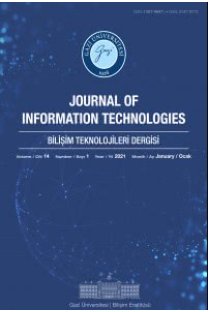Yükseköğretimde Her Yerde Öğrenmenin Akademik Başarı ve Motivasyona Etkisi
Bu araştırmada, her yerde öğrenmenin üniversite düzeyinde bir uygulaması yapılarak sonuçlar, ders başarısı ve derse yönelik motivasyon açısından değerlendirilmiştir. Araştırmada nicel araştırma yöntemlerinden deneysel desen kullanılmıştır. Trabzon ilinde, sınıfında uygulama için yeterli internet altyapısı olan bir üniversitede, Bilgisayar ve Öğretim Teknolojileri Eğitimi Bölümü 2.sınıf İnsan Bilgisayar Etkileşimi dersi kapsamında gönüllü öğrencilerinden oluşan bir örneklem seçilmiştir. Katılımcılar deney grubu ve kontrol grubu olarak ikiye ayrılmıştır. Gruplar 21’er kişiden oluşmaktadır. Deney grubuna 4 hafta boyunca her yerde öğrenme etkinlikleri destekli öğretim uygulanırken kontrol grubuna aynı öğretim her yerde öğrenme desteği olmadan sağlanmıştır. Araştırma sonucunda her yerde öğrenmenin uygulandığı öğrenci grubunun akademik başarıları ve motivasyon puanları diğer gruba göre anlamlı farklılık gösterdiği sonucuna ulaşılmıştır. Ayrıca, araştırma süreci ve sonuçları dikkate alınarak uygulamaya ve araştırmaya yönelik bir takım önerilerde bulunulmuştur.
Anahtar Kelimeler:
Her yerde öğrenme, akademik başarı, motivasyon, insan bilgisayar etkileşimi
The Effect of Ubiquitous Learning on Academic Achievement and Motivation in Higher Education: The Case of Human-Computer Interaction Course
In this study, ubiquitous learning method was implemented in higher education and the results were analyzed in terms of course achievement and motivation for the course. The study was conducted through experimental research design. The sample of the study is undergraduate students who are in their second year in a higher education institution having sufficient internet infrastructure within the classrooms in Trabzon province, are registered to Human-Computer Interaction course at Computer Education and Instructional Technology Department, and are voluntary to participate in the study. The participants are divided into two as experimental and control group. Each group has 21 students. While the instruction supported with ubiquitous learning activities was conducted in the experimental group throughout 4 weeks, the same instruction without ubiquitous learning activities was conducted in the control group. According to the study results, the academic achievement and motivation scores of the student group for which ubiquitous learning was implemented is significantly different than the control group. In addition, as considering research process and results, it was made recommendations for future research and implementation. *CRITICAL: This study was conducted by the first author as a part of a master’s thesis under the supervision of the second author.
___
- [1] P.-S. Tsai, G.-J. Huwang, C.-C. Tsai, "Development a survey for assessing preferences in constructivist context-aware Ubiquitous learning environments" Journal of Computer Assisted Learning, 250- 264 , 2011
- [2] Y. Huang, P. Chiu, T. Liu ve T. Chen, "The design and implementation of a meaningful learning-based evaluation method for ubiquitous learning" Computer & Education, 57, 2291-2302, 2011.
- [3] C.-C. Chen ve, T.-C. Huang, "Learning in a u-museum: Developing a context-aware ubiquitous learning environment", Computer & Education, 59, 873-883, 2012.
- [4] H.-Y. Jeong ve B.-H. Hong, "A pratical use of learning system using user preference in ubiquitous computing environment". Multimed Tools Appl., 64, 491-504, 2013.
- [5] Y. Liu, (2009). "A context-aware ubiquitous learning environment for language listening and speaking", Journal of Computer Assisted Learning, 25, 515-527, 2009.
- [6] W.-C. Shih, , S.-S. Tseng, , C.-C. Yang, C.-Y. Lin ve T. Liang, "A Folksonomy-based guidance mechanism for context-aware ubiquitous learning: A case study of Chinese scenic poetry appreciation activities", Educational Technology & Society, 15(1), 90-101, 2012.
- [7] W. Junqi, L. Yumei ve L. Zhibin, "Study of Instructional design in Ubiquitous Learning", 2010 Second International Workshop on Education Technology and Computer Science, IEEE, 2010.
- [8] S. Shih, B. Kuo ve Y. Liu, (2012). "Adaptively Ubiquitous Learning in Campus Math Path", Educational Technology&Society, 15(2), 298- 308, 2012.
- [9] M. Weiser, (1991). "The computer for the 21st century", Scientific american,265(3), 94-104, 1991.
- [10] W. Ng, H. Nicholas, S. Loke ve T. Torabi, "Designing Effective Pedagojical Systems for Teaching and Learning with Mobile and Ubiquitous Devices", Multiplatform E-Learning Systems and Technologies, Editör: T. Tiong (s. 42-56). Information Science Reference, New York, 42-56, 2010.
- [11] O.K. Boyinbode ve K.G. Akintola, "Effecting E-learning with U?learning Technology in Nigerian EducationSystem", The Pasific Journal of Science and Technology, 10(1), 204-210, 2009.
- [12] H. Peng, P.-Y. Chuang, G.-J. Hwang, H.-C. Chu, T.-T. Wu ve S.-X. Huang, "Ubiquitous Performance-support System as Mindtool: A case Study of Instructional Decision Making and Learning Assistant", Educational Technology & Society, 12(1), 107-120, 2009.
- [13] T.-Y. Liu, T.-H. Tan ve Y.-L. Chu, "Outdoor Natural Science Learning with an RFID-supported Immersive Ubiquitous Learning Environment", Educational Technology & Society, 12(4), 161-175, 2009.
- [14] G.-J. Hwang, H.-C. Chu, Y.-S. Lin ve C.-C. Tsai, "A knowledge acquisition approach to developing Mindtools for organizing and sharing differentiating knowledge in a ubiquitous learning environment", Computer & Education, 57, 1368-1377, 2011.
- [15] J.-L. Shih, H.-C. Chu, G.-J. Hwang ve Kinshuk, "An investigation of attitudes of students and teachers about participating in a context?aware ubiquitous learning activity", British Journal of Educational Technology, 42(3), 373-394, 2011.
- [16] K. Çağıltay, İnsan Bilgisayar Etkileşimi ve Kullanılabilirlik Mühendisliği: Teoriden Pratiğe. ODTÜ Yayıncılık, Ankara,Türkiye, 2011.
- [17] H. Kutu, ve M. Sözbilir , "Öğretim Materyalleri Motivasyon Anketinin Türkçeye Uyarlanması: Güvenirlik ve Geçerlik Çalışması", Necatibey Eğitim Fakültesi Elektronik Fen ve Matematik Eğitimi Dergisi, 5(1), 292-312, 2011.
- [18] Ş. Büyüköztürk. Sosyal Bilimler İçin Veri Analizi El Kitabı, Pegem Yayıncılık, Ankara,2014.
- ISSN: 1307-9697
- Yayın Aralığı: Yılda 4 Sayı
- Başlangıç: 2008
- Yayıncı: Gazi Üniversitesi Bilişim Enstitüsü
Sayıdaki Diğer Makaleler
İntranet-Tabanlı Bilişim Teknolojileri Servis Yönetimi Uygulaması
Mutlu Tahsin ÜSTÜNDAĞ, Emrah ÇEKİÇ
Ayrık Yapay Arı Kolonisi Algoritması ile Protein Yapısı Tahmini
Bilişim Alanında İşlenen Suçlar Üzerine Bir İnceleme
Ercan Nurcan YILMAZ, Serkan GÖNEN, Halil İbrahim ULUS
Fırsat Sitelerinden Tekrar Satın Alma Kararını Etkileyen Faktörlerin Araştırılması
Çiğdem ALTIN GÜMÜŞSOY, Ali Can YETEREL
Yükseköğretimde Her Yerde Öğrenmenin Akademik Başarı ve Motivasyona Etkisi
Cüneyt BAYILMIŞ, Mehmet ÖZDEMİR
Hüseyin Serdar GEÇER, Erman COŞKUN, Kamil TAŞKIN, Semih BİTİM
Bilgi Güvenliği Kapsamında Yeni Bir Veri Şifreleme Algoritması Tasarımı ve Gerçekleştirilmesi
